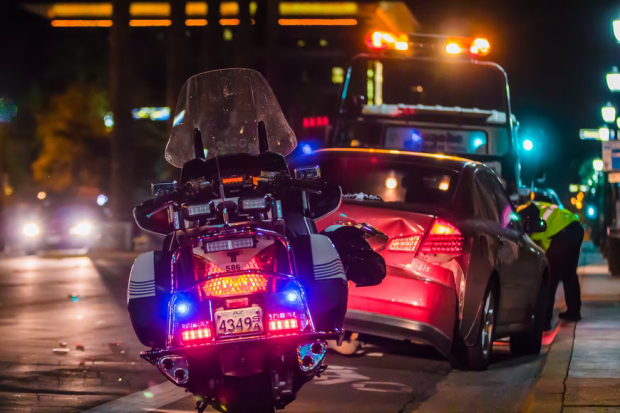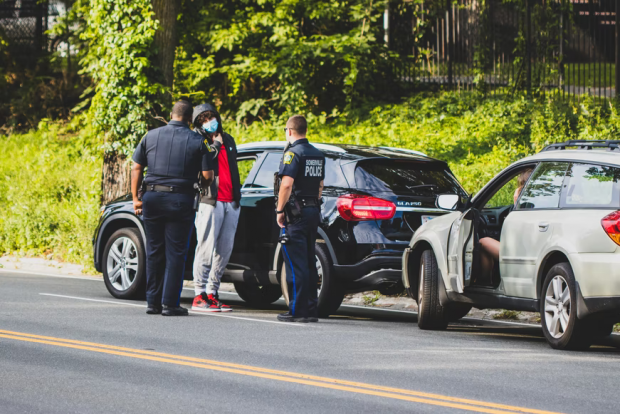
(Photo: How to Handle a Car Accident While Traveling)
Taking a vacation is typically a much-needed break from your everyday life - a time when worries and stress melt away, and you can enjoy some uninterrupted relaxation. An auto accident is the last thing you expect to deal with while traveling.
Even if you follow all local traffic laws and drive carefully, you can't avoid some collisions. Bad weather or other drivers are out of your control, no matter how safe you try to be.
If you are involved in an accident, you're left wondering what to do after a car wreck instead of enjoying your fun-filled vacation. A crash can not only put a damper on your trip but can also leave you feeling confused. If you've traveled out of state, you're likely unfamiliar with the area.
Being in an accident far from home can leave you feeling disoriented, frustrated, and possibly overwhelmed. However, there are some steps you can take if you happen to find yourself in a collision while traveling to make the process easier.
Call the Local Police After an Accident
While some drivers might think minor fender benders with little damage may be resolved with a simple exchange of information, it is wise to make a call to the police after a crash - even if it's small. Many states have laws in place requiring you to contact the police in the event of an accident, so be sure to read up on the local laws where you are visiting.
If your accident results in injuries or severe damage, having police on the scene can help you work through the process correctly. They can provide you with temporary medical care until EMS arrives and block off your accident location so an investigation can occur.
If you are hit by an uninsured motorist or the victim of a hit and run, having a police report and a proper investigation can help with your insurance claim. It's crucial if you were not at fault for the accident. Police reports will provide concrete evidence to your insurance company so you can receive the correct compensation.
After a collision, attempting to gather information yourself can result in missed evidence and potential doubt from the insurance providers. Unless your accident resulted in no damage or injuries, calling the police should be your first step.
Contact Your Insurance Company to File a Claim
Most insurance policies will provide you with the same coverage even while traveling, though it's best to confirm this with your agent before embarking on your journey. Some policies will cover you only within the U.S., while others may extend into Canada.
Speaking to your insurance agent can help you confirm how much coverage you have and if you should add any temporary policies to your plan while traveling. Be sure to cover the state you're traveling to and any you might be passing through along the way. An accident could occur at any point in your vacation journey, so it's best to be prepared.
If an accident occurs, call your insurance company and explain the situation. You may want to do this while on the scene so your provider can explain all the information they need. The police should also give you an accident report you can then pass on to your provider.
Once you've reported the accident, your insurance company will explain the next steps. They may send a local adjuster to assess the damage if the company extends to your current location. If not, they might choose to have someone travel to your current area instead.
Repair Your Vehicle if the Damage Is Severe
After you speak with your agent, they can help you find a local mechanic to repair your car. Although you may be far from home, your insurance company should still be able to locate towing assistance and repair shops to help you after your accident.
Depending on the reach of your provider, they may already have towing and repair locations in their network at your current location. However, if your insurance company is smaller, they may have to research local businesses to find assistance for things like a broken side-view mirror or crumpled door.
No matter your provider's reach, they will be able to assist you through the process. Be sure to ask about turnaround times since you are likely limited to only a few days before you must leave to head home. If repair times are too lengthy, your insurer may opt to have your vehicle transported back to your local area and have it repaired there instead.

Rent a Car for the Remainder of Your Trip
If your vehicle is damaged, you won't be using it to continue on your vacation. Depending on repair turnarounds, you may not even be able to drive it home. In this case, you will likely need to consider a rental car for transportation.
Depending on the details of your accident, the cost of your rental car might be completely free. If your accident was the fault of another driver, their insurance company should provide you with an equivalent rental at no cost to you.
Be sure to confirm the car you will receive is similar to your everyday vehicle. For example, if you own a large-sized SUV, you should receive an equivalent rental car.
Claiming responsibility
The other party involved in your accident must claim responsibility immediately if they were at fault. Otherwise, their insurance will not pay for your rental car until the responsibility is proven. There is a high likelihood you may find yourself in a dispute with the other party's insurer.
Unless the other driver hits your vehicle from behind, most accidents will be disputed by the at-fault party. This is also an excellent reason to have police on the scene and to collect witness statements - both can be used as evidence for your case.
If you need a rental immediately, save your receipts and temporarily pay out of pocket. Once the fault is confirmed, the other driver's insurance company should reimburse you for the cost.
Handling Accidents While on the Road
Vacations are meant to be relaxing and stress-free experiences. However, a car accident can quickly turn your trip into a massive headache. While no one wants to deal with a collision while traveling, it's essential to know what to do if it happens to you.
If you find yourself in a crash, call the police department local to your current location. They will provide you with assistance and proper documentation. Next, talk to your insurance company to get your claim filed. Finally, get a rental and enjoy the rest of your vacation.
Don't let an accident ruin your trip. Though the event may be stressful and somewhat time-consuming, it doesn't have to put a damper on your entire vacation. Move forward and soak up whatever time you have left.
Alexandra Arcand writes and researches for the insurance and legal advice site, FreeAdvice.com. She is an insurance expert and avid traveler who enjoys sharing her tips with others to stay safe while traveling.
This article is copyrighted by Travelers Today, the travel news leader
* This is a contributed article and this content does not necessarily represent the views of travelerstoday.com



